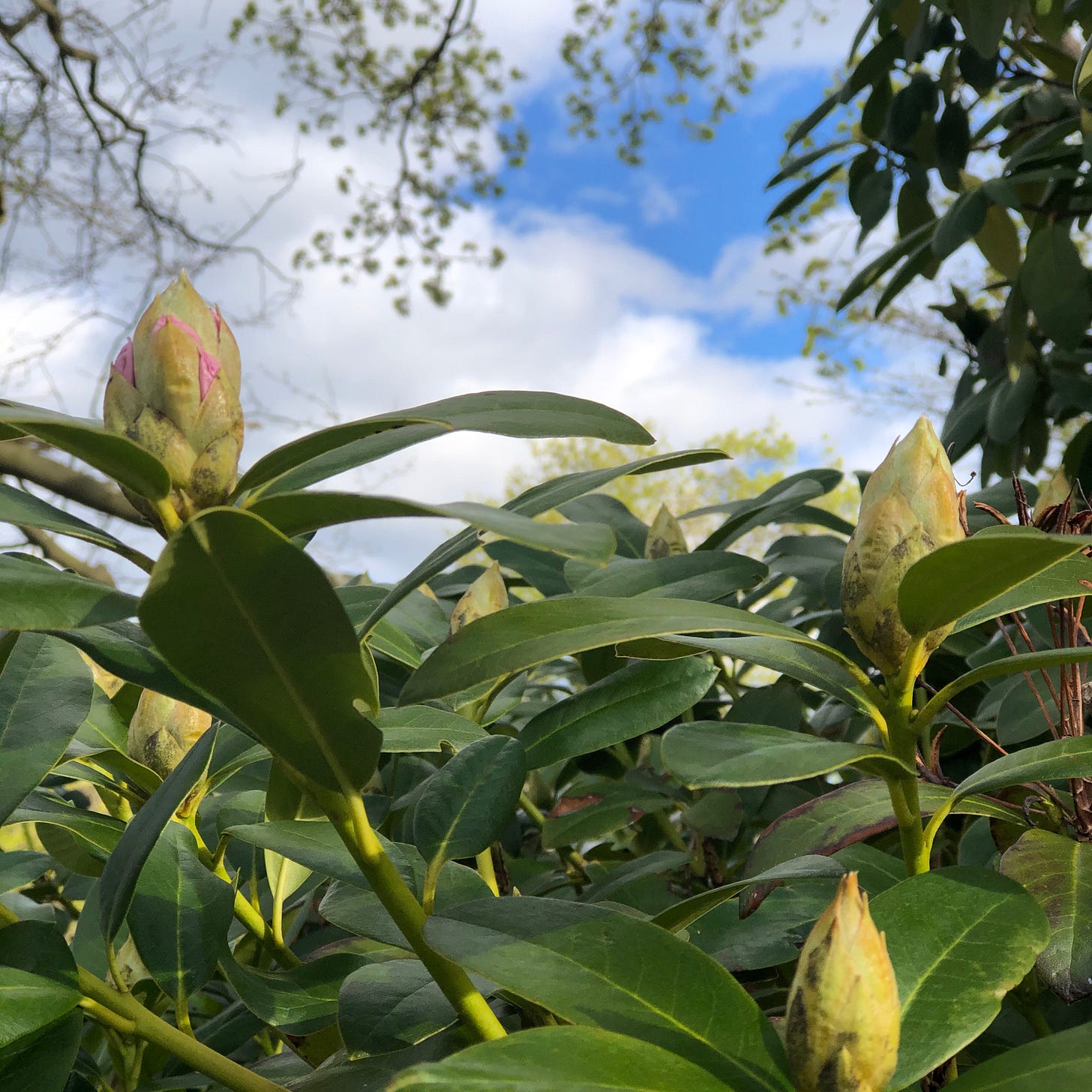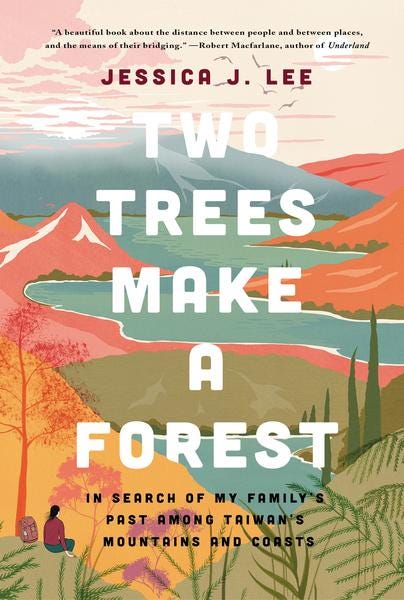Dear Reader,
The yellows in the garden are having their last fandango, and the pinks are waiting in the wings.
Our beloved sycamore is budding out, too.
Our themes this week are forest and family, and we find ourselves in the very capable hands of Jessica Lee, a leader in a new global generation of nature and place writers of color—who are writing not only in English but in many languages, and all around the world.
Review
Two Trees Make a Forest:
In Search of my Family’s Past Among Taiwan’s Mountains and Coasts
Jessica J. Lee
Catapult, 2020
282 pages
$16.95
Figuring that it was my last chance, I drove up to Exeter, New Hampshire with a friend exactly 11 years ago this week, to hear W. S. Merwin read his poems. Merwin was 82, quiet and gallant. He read poems from every stage of his career, chronologically. When he movingly read “Rain Light” to close out the reading, it hit me. From the first to the last, every poem had been in some sense about our ecological catastrophe. He had been writing about the tragedy of the Anthropocene for fifty years, and things had only gotten worse. Now he needed to let go. “Even though the whole word is burning.”
Many of the poems Merwin read were about trees. After living in the continental US, Mexico, England, Spain, and France, he moved to Hawaii in 1976, where he restored a former pineapple plantation and created one of the largest palm gardens in the world. I was sent back to my Merwin books this week while reading Jessica J. Lee’s Two Trees Make a Forest. From his 1988 collection, Rain in the Trees, comes this poem.
Witness
I want to tell what the forests
were likeI will have to speak
in a forgotten language
In Two Trees Make a Forest, Jessica Lee recounts her pilgrimage of witness and reclamation amid the wild forests and mountains of Taiwan. Lee was raised in Canada, the daughter of immigrants. Her mother came from Taiwan as a girl with her parents, who fled there from mainland China during the Communist Revolution. Young Jessica called her grandfather Gong and her grandmother Po. Lee’s father is Welsh. She attended university in the UK, earned a Ph.D. in environmental history and aesthetics, and now lives and writes in Berlin. Her first book, Turning: A Year in the Water, describes her efforts to recover from heartbreak through a practice of wild swimming in the many lakes of the Brandenburg region around Berlin. She is the Founder and Editor of the Willowherb Review, an online literary journal featuring nature and place writing by authors of color.
This memoir braids together the story of the island itself with Lee’s quest to understand both her family’s past and her own Taiwanese identity. Her portrait of the island, “a foothold in a churning sea,” helps us to appreciate from the start its verdant, steeply mountainous beauty and its unique ecology, abundant in species that are found nowhere else in the world—such that these “mountains become islands of their own.”
The jump to precipitous peaks creates a wealth of habitats, such that the island sustains a range of forests much vaster than its small footprint . . . A green washes itself over Taiwan’s hillsides, a mottled, deep hue that reminds me more of a lake than of land, of darkened waterweed more than tree. The green rolls out on the horizon, glinting with occasional light, but more often steaming with the low-hanging clouds that cling to the border between hillside and sky. That verdant hue is unlike any other I know.
A discovery sparks Lee’s pilgrimage. After Po’s death, Lee’s mother finds a group of unsent letters—a kind of memoir spiraling in on itself—written by Gong after he had developed dementia. Her mother also finds phone bills showing calls to Taiwan and mainland China. Lee had been raised to think that her family had lost all contact with their relations in Taiwan and China, but these materials provide suggestive clues. After Po and Gong’s separatIon, Po took Gong back to Taiwan to live out his remaining years in a care home, where he died alone in 2008. In 2013, Lee and her mother decide to make a trip back to Taiwan, to visit his remains. Once there, Lee is surprised by how “at home” her mother seems.
I watched her skittering from incoming waves like a sandpiper searching for clams, and saw something of the past in her. In Taiwan, though so much had changed, my mother became a person with a topographic history, a person set into the scene in which she believed she belonged. In my childhood, I never saw that in her: In forty years of life in Canada she had never rooted to the place and got lost easily . . . But on the beach I realized that she’d carried something of the island in her the entire time, molecularly, absorbed the way water swells beneath the skin.
Could Taiwan become a kind of home for Lee also? Lee makes a series of trips to Taiwan, hiking the mountains, exploring the coastline in search of rare birds, making friends, discovering the local literary scene, and improving her Mandarin. The book is divided into four sections: Dao (Island), Shan (Mountain), Shui (Water), Lin (Forest, or Group of Like Persons). Each section contains a mixture of natural exploration, Taiwanese history, and family history. Her writing on plant life is informative and evocative, the prose style recalling that of her mentor and colleague, Robert Macfarlane.
The trees were heavy-slung with the lazy shapes of lianas dangling from the branches. Every so often in a clearing, we’d find a looking-glass tree, its buttress roots like pale batwings propping the base of the mangrove, its shape a bizarre reflection of its funhouse name. The tree seemed to belong to an inverted fantasy world, with roots braced perpendicular to the ground, exposed to the air and tall enough to reach a child’s house up the trunk, a visible reminder of the vast worlds contained beneath all the other trees.
Her adventures are filled with “an inarticulate longing,” and with sorrow that she did not know her grandfather better before dementia claimed his mind and memory. Indeed, the life stories of Gong and Po that Lee uncovers are epic tales of loss, survival, labor, and more loss. She traces Gong’s life, from his beginnings in a rural village north of Beijing to his role as a pilot for the nationalist KMT forces. She outlines Po’s life as well, starting with her upbringing in a wealthy merchant family in Nanjing. Po fled that city in 1937, escaping the massacre carried out by the Japanese army, and later left the mainland for Taiwan, where she met Gong. Over many decades, they endured much and suffered much. In their wake, Lee finds both emptiness and acceptance. There is a sense of reserve in her voice, and her refusal to romanticize their past—or her own experiences—is admirable.
On another expedition in Taiwan, she encounters a great Barringtonia asiatica tree, whose fruit is often carried on the open ocean and can survive for more than ten years.
In Chinese, the Barringtonia’s name, 玉蕊树, means “jade stamen tree,” but its pronunciation, yuruike, is what brought me joy: privately I began to call it the eureka tree. A tree ever in search of newness, it makes a home wherever the sea might send it.
The place writers we value most possess the virtue of making a kind of home wherever life sends them. Jessica Lee is just such a writer. Two Trees Make a Forest would serve as a perfect prelude to a journey to Taiwan. For those of us who can only dream of such a sojourn under present circumstances, the book offers a compelling alternative. As Merwin would have it, Lee tells us what the forests are like, and in the process she reclaims the language needed to do so.
Poem of the Week
One can never have too much Merwin. This poem and many more are available on The Merwin Conservancy’s website. There is also a beautiful documentary about Merwin, produced in 2014, that is available to stream.
Other Forms, Other Voices
Edward Yang was one of the great directors in the history of Taiwanese cinema. His 2000 film Yi Yi describes a year in the life of a multi-generational family in Taipei. This late-career masterpiece begins with a famous set-piece wedding and ends with a funeral. The film is available on the Criterion Channel streaming service.
For Your Reading Radar
This week marks the release of the Finding the Mother Tree, the eagerly awaited book from tree scientist Suzanne Simard. Her breakthrough research has widened our understanding of how trees build ecosystem communities around them through cooperation and communication. One reviewer says the book is “a literary revelation, that botany class you never knew you needed.”
For Your Calendar
On Friday, May 7 at 3 PM Pacific time, Emergence Magazine and Point Reyes Books will be hosting Suzanne Simard in conversation with David Haskell, whose book The Songs of Trees I can also strongly recommend.
Bookstore of the Week
In honor of Merwin and our Asia theme, check out Talk Story Bookstore, the westernmost bookstore in the United States. It’s located in the town of Hanapepe, on the Hawaiian island of Kauai. Talk Story is overseen by the large-and-in-charge Celeste, one of the world’s most charismatic bookstore cats. Like most small bookstores, especially those in tourist-driven economies, Talk Story has suffered a decline in business over the past year, so please do consider supporting them through a purchase or a donation. Celeste t-shirts are on offer!
That’s it for this week. Go hug a tree! xo Nicie












